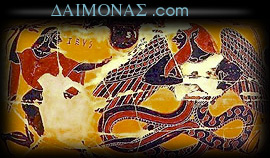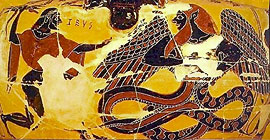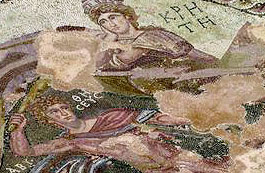AUTHOR: about the Daimonas
EXPLANATION The most contentious character in the Greek is the character "Y", ("ypsilon", which itself is miswritten as "upsilon" and mispronounced as "oopsilon"). (The "Y" character has anomalous properties in the English as well, evidence Year, mY, and maY.) In its upper case form it is identical in appearance to the Latin "Y". In its lower case appearance it looks similar to the upper-case Latin "U". However, just because it looks like an upper case Latin "U" when rendered in its lower case form, does not mean it is pronounced so. Its pronunciation is actually dependant on whether it appears before or after another vowel, & what that vowel might be. For some reason, Greek words which appear in the upper-case Greek as (for example) "ZEYS" are re-written in languages like Englsih as "zeus"(!) instead. To actually transcribe this word as it should be pronounced in English, it should appear as "Zevs". The correct pronounciation of what in English is rendered "Zeus" is ZEVS. It is not, as is claimed in English glossaries, pronounced "zoows". Greek "EY" = Latin EV (not eu); Greek "AY" = Latin AV (not au); Greek "OY" produces the same sound as "OO" does in English, or the same sound as does "U" in German and Italian. This is the only instance in which to render it "OU" in Latin characters produces the correct sound in Greek as well.
It is interesting to note that the Greek word for spirit/ghost, ΨΥΧΗ ("psyche"), if rendered according to this convention should actually be rendered: "psuche"! If "Y" appears before any other character it is an "I" sound, and so should be renedered so, eg.: ypsilon & not Upsilon. The pronunciation of "Y" as "V" can be shown to have been so to at least c.270 BC. In the Septuagint translation of the Jewish Old Testament, from Hebrew to Greek, the word "Leviticus" for example is rendered with the "Y" character and thus appears as ΛΕΥΕΤΙΚΟΝ - which means that if it were transcribed today into Latin characters it would incorrectly appear as "Leuiticus".
| |||||||||||||




